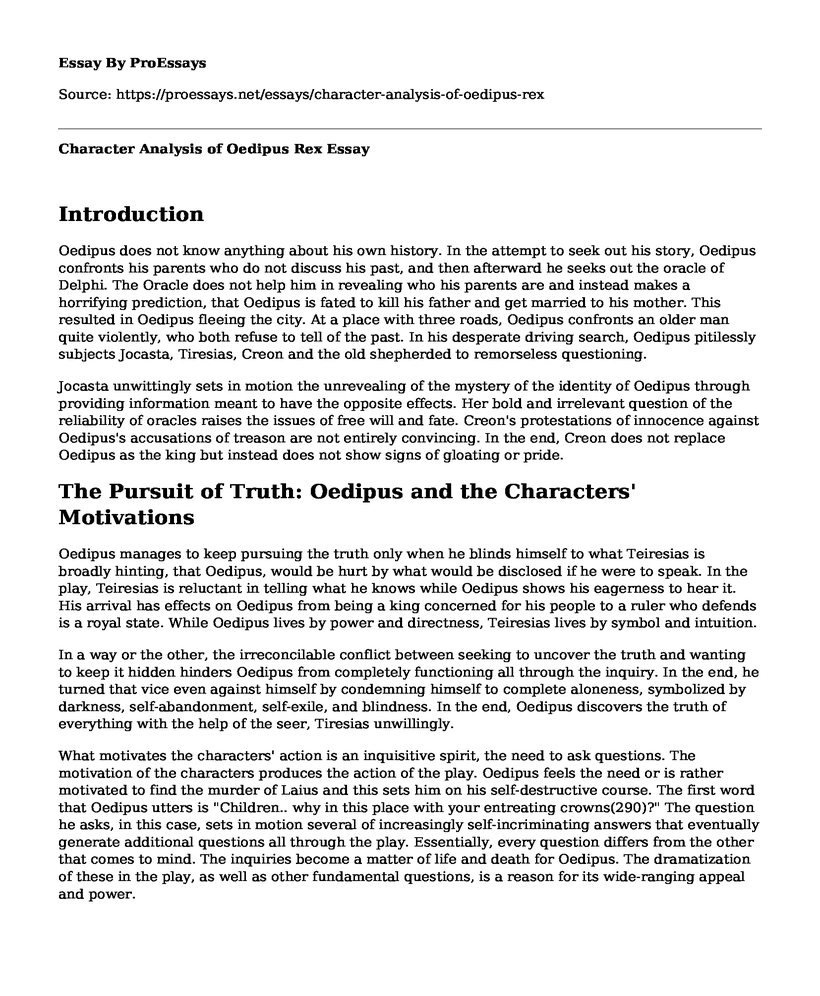Introduction
Oedipus does not know anything about his own history. In the attempt to seek out his story, Oedipus confronts his parents who do not discuss his past, and then afterward he seeks out the oracle of Delphi. The Oracle does not help him in revealing who his parents are and instead makes a horrifying prediction, that Oedipus is fated to kill his father and get married to his mother. This resulted in Oedipus fleeing the city. At a place with three roads, Oedipus confronts an older man quite violently, who both refuse to tell of the past. In his desperate driving search, Oedipus pitilessly subjects Jocasta, Tiresias, Creon and the old shepherded to remorseless questioning.
Jocasta unwittingly sets in motion the unrevealing of the mystery of the identity of Oedipus through providing information meant to have the opposite effects. Her bold and irrelevant question of the reliability of oracles raises the issues of free will and fate. Creon's protestations of innocence against Oedipus's accusations of treason are not entirely convincing. In the end, Creon does not replace Oedipus as the king but instead does not show signs of gloating or pride.
The Pursuit of Truth: Oedipus and the Characters' Motivations
Oedipus manages to keep pursuing the truth only when he blinds himself to what Teiresias is broadly hinting, that Oedipus, would be hurt by what would be disclosed if he were to speak. In the play, Teiresias is reluctant in telling what he knows while Oedipus shows his eagerness to hear it. His arrival has effects on Oedipus from being a king concerned for his people to a ruler who defends is a royal state. While Oedipus lives by power and directness, Teiresias lives by symbol and intuition.
In a way or the other, the irreconcilable conflict between seeking to uncover the truth and wanting to keep it hidden hinders Oedipus from completely functioning all through the inquiry. In the end, he turned that vice even against himself by condemning himself to complete aloneness, symbolized by darkness, self-abandonment, self-exile, and blindness. In the end, Oedipus discovers the truth of everything with the help of the seer, Tiresias unwillingly.
What motivates the characters' action is an inquisitive spirit, the need to ask questions. The motivation of the characters produces the action of the play. Oedipus feels the need or is rather motivated to find the murder of Laius and this sets him on his self-destructive course. The first word that Oedipus utters is "Children.. why in this place with your entreating crowns(290)?" The question he asks, in this case, sets in motion several of increasingly self-incriminating answers that eventually generate additional questions all through the play. Essentially, every question differs from the other that comes to mind. The inquiries become a matter of life and death for Oedipus. The dramatization of these in the play, as well as other fundamental questions, is a reason for its wide-ranging appeal and power.
Conclusion
Moved by the curiosity to solve his own mysteries, through the Sphinx riddle, Oedipus is trapped in a narrative thread, which leads him to satisfy his quest for the truth and to answer questions of what is story entails. In the end, Oedipus after making discoveries of his marriage -that he married his own mother, decides to go blind as a way of punishing his quest for knowledge, and the oracle is fulfilled.
Works Cited
Sophocles, E. A. Oedipus the king. Findaway World LLC, 2009.
Cite this page
Character Analysis of Oedipus Rex. (2022, Apr 28). Retrieved from https://proessays.net/essays/character-analysis-of-oedipus-rex
If you are the original author of this essay and no longer wish to have it published on the ProEssays website, please click below to request its removal:
- The Tone and the Theme in Emily Dickinson's Poem "There's a Certain Slant of Light"
- Wisdom in King Lear Essay Example
- Literary Analysis Essay on "Let America be America again"
- Essay on The Ferryman: Act 3 Scene - A Thatcher-Era Guerrilla War
- Essay Sample on Troy Maxson: Hero or Villain?
- Essay Example on Hamlet's Emotional Progression: Comparing Hecuba and To be or Not to Be
- The Chimney Sweeper: William Blake's Poem of Innocence - Essay Sample







